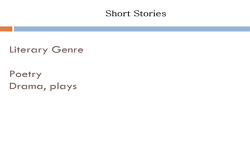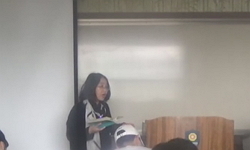It is well known that Joyce’s Dubliners describes paralyzed lives of Irish people in Dublin, and the epiphanies in the book shape the general theme of paralysis. Therefore, many critical studies have focused on the various aspects of paralyses and e...
http://chineseinput.net/에서 pinyin(병음)방식으로 중국어를 변환할 수 있습니다.
변환된 중국어를 복사하여 사용하시면 됩니다.
- 中文 을 입력하시려면 zhongwen을 입력하시고 space를누르시면됩니다.
- 北京 을 입력하시려면 beijing을 입력하시고 space를 누르시면 됩니다.
https://www.riss.kr/link?id=A101964945
- 저자
- 발행기관
- 학술지명
- 권호사항
-
발행연도
2016
-
작성언어
Korean
- 주제어
-
등재정보
KCI등재
-
자료형태
학술저널
- 발행기관 URL
-
수록면
81-102(22쪽)
-
KCI 피인용횟수
0
- 제공처
-
0
상세조회 -
0
다운로드
부가정보
다국어 초록 (Multilingual Abstract)
It is well known that Joyce’s Dubliners describes paralyzed lives of Irish people in Dublin, and the epiphanies in the book shape the general theme of paralysis. Therefore, many critical studies have focused on the various aspects of paralyses and epiphanies. However, not much attention has been paid to the moral problem in Dubliners. In Dubliners, Joyce intended “to write a chapter of the moral history of my nation.” Then, what is the relation between the intention and the theme of paralysis? That is, how do paralysis and epiphany develop into a moral problem? To answer this question, this paper focuses on “The Dead” and analyzes the process of Gabriel’s achievement of epiphany in the angles of irony and dialogism. Gabriel, encountering others, experiences unexpected conflicts and thereafter changes his views on others and on himself. That is, Gabriel achieves his epiphany by accepting others’ views. Irony, in this process, reveals the limit of Gabriel’s views and helps him achieve a wider view on life and the world. According to Bakhtin, man occupies unique temporal-spacial positions in the world, which results in a limited view of himself and the world. Therefore, he should accept other people’s views to complete the objective image of himself. This is the basic assumption Bakhtin’s dialogism rests upon. Man should accept other people’s views and recognize the multiplicity and mutability of life and the world. Man can thereby avoid “monologism” where only one principle or view reigns, and achieve “dialogism” Both irony and dialogism, as such, helps to understand not only ironic and dialogic aspects in Dubliners, but also the way paralysis and epiphany in Dubliners, especially in “The Dead,” are related with Joyce’s moral intention.
참고문헌 (Reference)
1 Eggers, Tilly, "What Is a Woman . . . a Symbol Of?" 18 (18): 379-395, 1981
2 Lawrence, Karen, "The Odyssey of Style in Ulysses" Princeton UP 1981
3 Joyce, James, "Selected Letters of James Joyce" Faber and Faber 1975
4 Bakhtin, Mikhail, "Problems of Dostoevsky’s Poetics" Minnesota UP 1987
5 Joyce, Stanislaus, "My Brother’s Keeper" Faber and Faber 1958
6 Morson, Saul, "Mikhail Bakhtin : Creation of Prosaics" Stanford UP 1990
7 Beck, Warren, "Joyce’s Dubliners : Substance, Vision and Art" Duke UP 1969
8 Hutcheon, Linda, "Irony’s Edge : The Theory and Poetics of Irony" Routledge 1995
9 Muecke, D. C, "Irony" Methuen 1970
10 Beja, Morris, "Epiphany in the Modern Novel" Washington UP 1971
1 Eggers, Tilly, "What Is a Woman . . . a Symbol Of?" 18 (18): 379-395, 1981
2 Lawrence, Karen, "The Odyssey of Style in Ulysses" Princeton UP 1981
3 Joyce, James, "Selected Letters of James Joyce" Faber and Faber 1975
4 Bakhtin, Mikhail, "Problems of Dostoevsky’s Poetics" Minnesota UP 1987
5 Joyce, Stanislaus, "My Brother’s Keeper" Faber and Faber 1958
6 Morson, Saul, "Mikhail Bakhtin : Creation of Prosaics" Stanford UP 1990
7 Beck, Warren, "Joyce’s Dubliners : Substance, Vision and Art" Duke UP 1969
8 Hutcheon, Linda, "Irony’s Edge : The Theory and Poetics of Irony" Routledge 1995
9 Muecke, D. C, "Irony" Methuen 1970
10 Beja, Morris, "Epiphany in the Modern Novel" Washington UP 1971
11 Joyce, James, "Dubliners" Penguin Books 2000
12 Holquist, Michael, "Dialogism : Bakhtin and His World" Routledge 2002
13 Power, Arthur, "Conversations with James Joyce" Chicago UP 1974
동일학술지(권/호) 다른 논문
-
버지니아 울프의 “인상주의”와 『제이콥의 방』의 공간적 구성
- 한국제임스조이스학회
- 김윤정 ( Yunjung Kim )
- 2016
- KCI등재
-
아일랜드성(Irishness)과 본질들의 형이상학: 조이스를 중심으로
- 한국제임스조이스학회
- 오길영 ( Gilyoung Oh )
- 2016
- KCI등재
-
Wandering Multiple Pathways: “Labyrinth-Spiel” and Joyce`s Mazed “Wandering Rocks”
- 한국제임스조이스학회
- ( Sungjin Jang )
- 2016
- KCI등재
-
- 한국제임스조이스학회
- 최석무 ( Seokmoo Choi )
- 2016
- KCI등재
분석정보
인용정보 인용지수 설명보기
학술지 이력
| 연월일 | 이력구분 | 이력상세 | 등재구분 |
|---|---|---|---|
| 2026 | 평가예정 | 재인증평가 신청대상 (재인증) | |
| 2020-01-01 | 평가 | 등재학술지 유지 (재인증) |  |
| 2017-01-01 | 평가 | 등재학술지 유지 (계속평가) |  |
| 2013-01-01 | 평가 | 등재학술지 유지 (등재유지) |  |
| 2010-01-01 | 평가 | 등재학술지 유지 (등재유지) |  |
| 2008-01-01 | 평가 | 등재학술지 유지 (등재유지) |  |
| 2005-01-18 | 학술지등록 | 한글명 : 제임스조이스저널외국어명 : James Joyce Journal |  |
| 2005-01-01 | 평가 | 등재학술지 선정 (등재후보2차) |  |
| 2004-01-01 | 평가 | 등재후보 1차 PASS (등재후보1차) |  |
| 2003-01-01 | 평가 | 등재후보학술지 선정 (신규평가) |  |
학술지 인용정보
| 기준연도 | WOS-KCI 통합IF(2년) | KCIF(2년) | KCIF(3년) |
|---|---|---|---|
| 2016 | 0.06 | 0.06 | 0.08 |
| KCIF(4년) | KCIF(5년) | 중심성지수(3년) | 즉시성지수 |
| 0.09 | 0.09 | 0.386 | 0 |





 KISS
KISS






